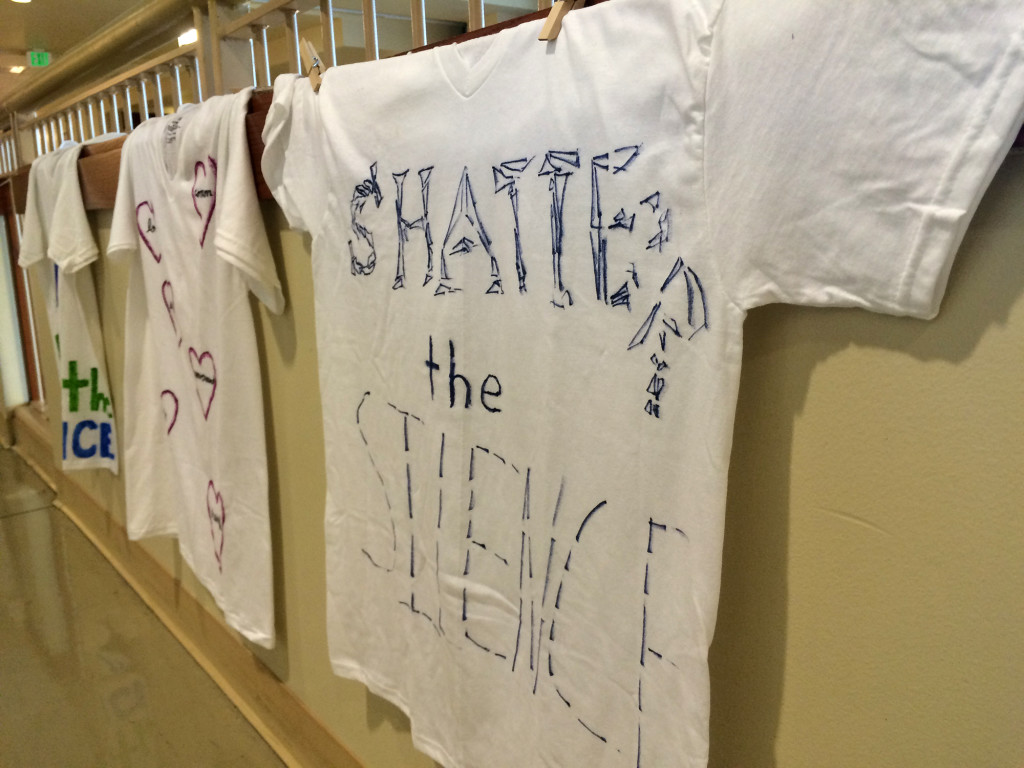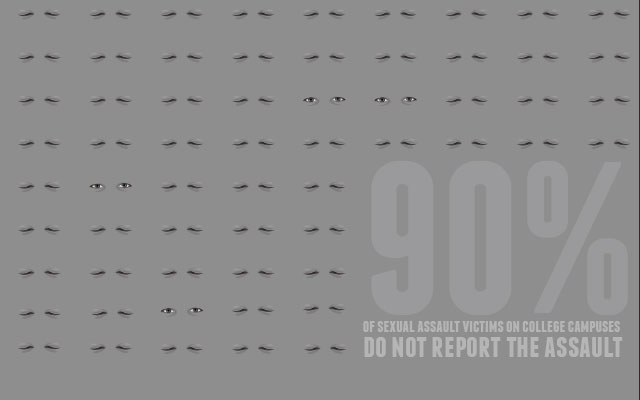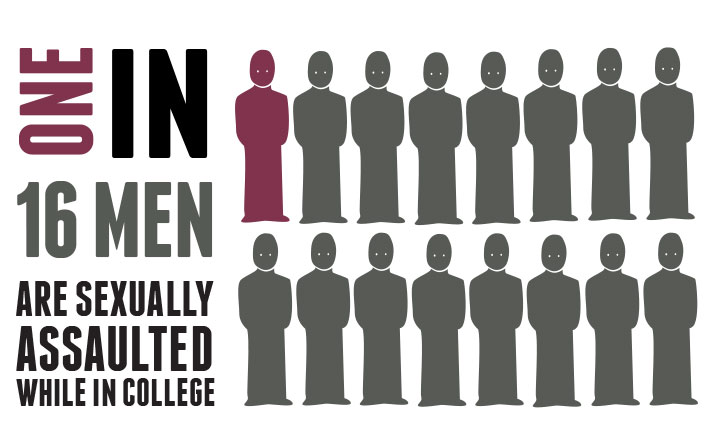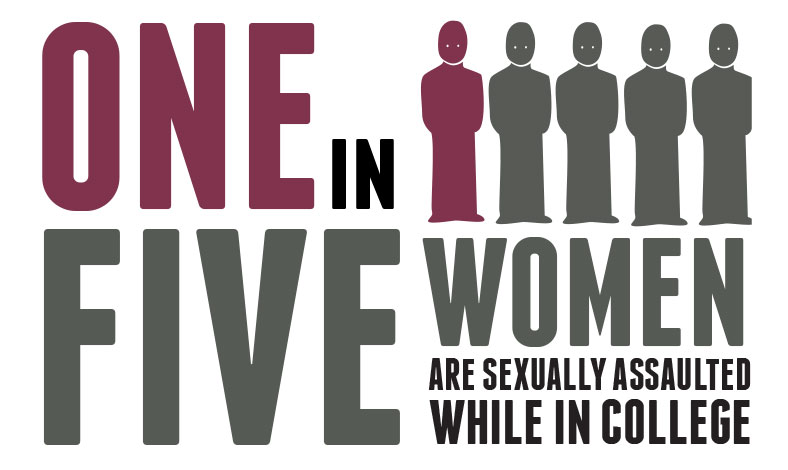This year Seattle University continues the annual tradition of Take Back the Night—along with other projects—during April, sexual assault awareness month. This month demands that survivors are seen as people above all else. By including all people of all backgrounds and identities, survivors and allies can join together in solidarity against sexual assault. It’s about more than starting a conversation or a single event—this is a movement aimed at changing the very systems and social structures that perpetuate sexual violence. Our community stands together.
The numbers are always hauntingly present. According to the National Sexual Violence Resource Center, one in every five women and one in every 16 men are sexually assaulted in college, yet more than 90 percent of sexual assault victims on college campuses do not report the assault.

For Sexual Assault Awareness Month the Clothesline Project went on display on the third floor of the Student Center in front of the OMA office.
But survivors of sexual assault and their allies are more than just a number. They are people with stories and voices that deserve to be heard and fought for. It is with this mindset that Seattle University plans to move forward as a community.
In anticipation of Health and Wellness Crew’s annual event Take Back the Night and the recent launch of the Green Dot strategy for our campus, Seattle U members seeks to advocate for those affected by sexual violence.
HAWC members Helena Laubach and Brenna Ingemunson are leading this year’s TBTN. Their hope is that the event will be the most inclusive it has ever been.
Historically the international event has been mainly angled towards people who identify as women. In Seattle U’s advertisements for the event in the past, silhouettes of women and then eventually people of all gender identities were presented to help spread awareness.
“This year we just decided to forego the silhouettes altogether, that way [the event] is not defining anybody by any shape,” Laubach said. “That’s kind of the main way it’s been more exclusive, is what people see in the advertising and then what it historically has been.”
Ingemunson emphasized that HAWC is trying to make students aware that they don’t have to be a survivor to attend the event. Whether a student is a a friend of a survivor, an ally or an actual survivor of sexual assault, the main message is one of support and solidarity.
“I am a survivor of sexual assault, and when I went last year it was very powerful,” Ingemunson said. “I found it very beneficial and moving to see other students there.”
Because sexual violence is such a sensitive and possibly triggering subject, HAWC has provided the full schedule online and in their advertising so people attending the event can know what subjects are most pertinent to them, for their own healing process or otherwise.
This year’s speaker is queer poet Kina Wolfenstein who was part of the Olympia National Slam Team last year. She has been involved with other TBTN events in various locations.
In conjunction with their work for TBTN, HAWC’s Green Dot Launch took place on Monday, April 4. Green Dot is an organization committed to “ending violence one green dot at a time,” with preventative measures specifically around sexual assault, dating and domestic violence and stalking.
The premise is to imagine the spread of red dots on a map of the world, each representing an act of violence or the choice to tolerate or perpetuate this violence. Any behavior that goes against this injustice is representative of placing a green dot on the map. The end goal is to relentlessly strive for a world of nothing but green dots.
According to Ryan Hamachek, the director of Wellness and Health Promotion, their office has been doing behind the scenes work with Green Dot, doing bystander intervention trainings and soliciting nominations.
“[Green Dot] is about shifting culture,” Hamachek said. “What we try to do with Green Dot is re-frame it and help people think about not the pain and difficulty of sexual violence, because that’s very real, but how do we help them focus on hope and change.”
The programs and curriculum involved in Green Dot are all informed by national research, where bystander intervention programs are showing efficacy in ending violence.
As the movement continues to gain speed and support on Seattle U’s campus, the battle against sexual violence and many forms of injustice will continue on.
“How do we get people to think about what it would be like if not one person on this campus experienced sexual assault next year?” Hamachek said. “We would change innumerable lives if we could do that. For me, it’s about inspiring that vision.”
TBTN will be held this Thursday, April 7, beginning with the traditional march held in the Hearth at 7 p.m. followed by a candlelight vigil held in STCN 160.
Vikki may be reached at vavancena@su-spectator.com
“How do we get people to think about what it would be like if not one person on this campus experienced sexual assault next year? We would change innumerable lives if we could do that. For me, it’s about inspiring that vision.”
—Director of Wellness and Wellness Promotion, Ryan Hamachek
Resources
Green Dot Bystander Intervention Training
On May 14, Green Dot will be hosting a training about how to equip students with the skills to proactively prevent sexual assault, and how to identify the signs of it. The event will also help students discuss what would prevent them from intervening in an at-risk situation. Green Dot will be signing students up for this event throughout the month of April. It is a full day event.
On Campus
There are both confidential and non-confidential on-campus resources for survivors of sexual assault. Counseling and Psychological Services, Campus Ministry and the Student Health Center are all confidential sources of aid on campus. For students seeking out other types of support, Public Safety and Housing and Residence Life can provide connections with other resources, but are not inherently confidential. The Office for Wellness and Health Promotion can provide general education about sexual assault, as well as student-to-student support. The Office of Integrity Formation is a place that students can contact for information regarding necessary housing or class changes and no-contact orders.
Off Campus
Students are also encouraged to pursue off-campus resources, such as the Seattle Police, or one of the local emergency rooms listed below. The Harborview Center for Sexual Assault & Traumatic Stress provides services to survivors of assault, and the Harborview Medical Center can provide confidential medical care and connect survivors with other resources.
Get Involved in the Community
Sexual assault affects those both on our campus as well as in our local community. King County Sexual Assault Resource Center provides services for people of all ages in the greater Seattle area. Beyond sexual assault trauma resources they seek to give a voice to victims, change harmful pervasive systems, and instill courage for people to speak out against sexual assault. Sign up for their e-newsletter, volunteer at their many events, or work on changing local policy through collective action. Learn more at their website, kcsarc.org
There are also several sexual assault hotlines wherein students can seek resources (see the Seattle University website). Additionally, there are many more off-campus resources available for both emotional and legal guidance.
Swedish Medical Center
(Cherry Hill) 206-320-2000
Swedish Medical Center
(First Hill) 206-386-6000
Harborview Medical Center
206-744-3000










